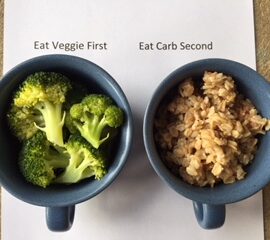Eat your vegetables first at mealtime
Keep your blood sugar in a healthy range
The amount and type of carbohydrate eaten at a meal affects post-meal blood glucose levels. Keeping blood glucose levels in check after meals helps prevent or manage type 2 diabetes. Would the order in which meal components, as expressed in terms of their carbohydrate content, affect post-meal blood glucose?
Japanese researchers conducted two studies regarding effects of eating vegetables before carbohydrate on post-meal blood sugar and insulin. The first, short-term study involved 15 type 2 diabetic participants eating vegetables and rice during a test meal. Compared to eating rice before vegetables, eating vegetables before rice led to lower blood glucose and insulin 30 and 60 minutes post-meal.
The second study included a retrospective analysis of blood HbA1c levels over 2.5 years. HbA1c is a protein that integrates blood sugar levels over a 2-3 three month period. One hundred ninety-six type 2 diabetic participants were counseled to eat vegetables before rice during their daily meals, while 137 type 2 diabetic participants were not so counseled. After two months and continuing to 30 months, participants in the “eat vegetables before rice” group showed statistically and clinically significant decreases in HbA1c levels from 7.8 to 7.3 percent. In addition, participants in the “eat vegetables before rice” group ate more vegetables and less rice without being asked to do so. Thus, simply counseling participants to eat vegetables before rice had positive long-term effects on blood sugar and insulin in diabetic persons. How about that!?
Are the above results from Japan applicable to us Americans? A pilot study at the Weill Cornell Medical College in New York showed that they are. Eleven male and female type 2 diabetic, overweight persons with an average age of 55 years participated in the study. In random order, participants consumed breakfasts with identical foods but presented in different orders following overnight fasts on two days one week apart. When participants ate protein and vegetables first and carbs second, blood glucose levels dropped significantly by 29, 37, and 17 percent at 30, 60, and 120 minutes post-meal, respectively. Total blood glucose and total insulin over the same time periods also dropped significantly. This study showed that simply altering the order of foods you eat at meals can help you keep blood glucose and insulin under control. Can you eat veggies and protein foods first and carbs second? Of course, you can
A follow-up of the above study with 16 type 2 diabetic patients confirmed that beginning a meal with protein and vegetables followed by carbohydrate significantly reduced post-meal blood glucose and insulin levels, compared to beginning a meal with carbohydrate. More specifically, eating protein and vegetables first in a meal reduced blood glucose and insulin concentrations and total glucose production over 90 minutes post-meal. Protein and vegetables included skinless chicken breast, lettuce, tomatoes, cucumber, butter, and salad dressing. Carbohydrate included orange juice and ciabatta bread. Eating carbohydrate last may delay stomach emptying and slow the rate of subsequent carbohydrate absorption.
Previous studies of the effects of “vegetables first, carbs last” have focused on older adults with type 2 diabetes. But what about those of us who aren’t diabetic? Would “vegetables first, carbs last” help us reduce post-mean blood sugar rises? A team of Japanese researchers answered this question. The researchers recruited 8 healthy young men and women with normal body-mass index. Participants ate three meals with identical constituents, but in random orders of 1) carb, then vegetable, then meat, 2) vegetable, then carb, then meat, and 3) vegetable, then meat, then carb. When participants ate meal 3), blood glucose 30 and 45 minutes after eating rose significantly less than with the other two meals. Similarly, blood insulin was significantly lower 20 minutes after participants ate meal 3). Thus, the “vegetables first, carbs last” approach to eating may help anyone, not just diabetics, keep blood sugar in a healthful range and manage type 2 diabetes or avoid it altogether. Give it a try!








